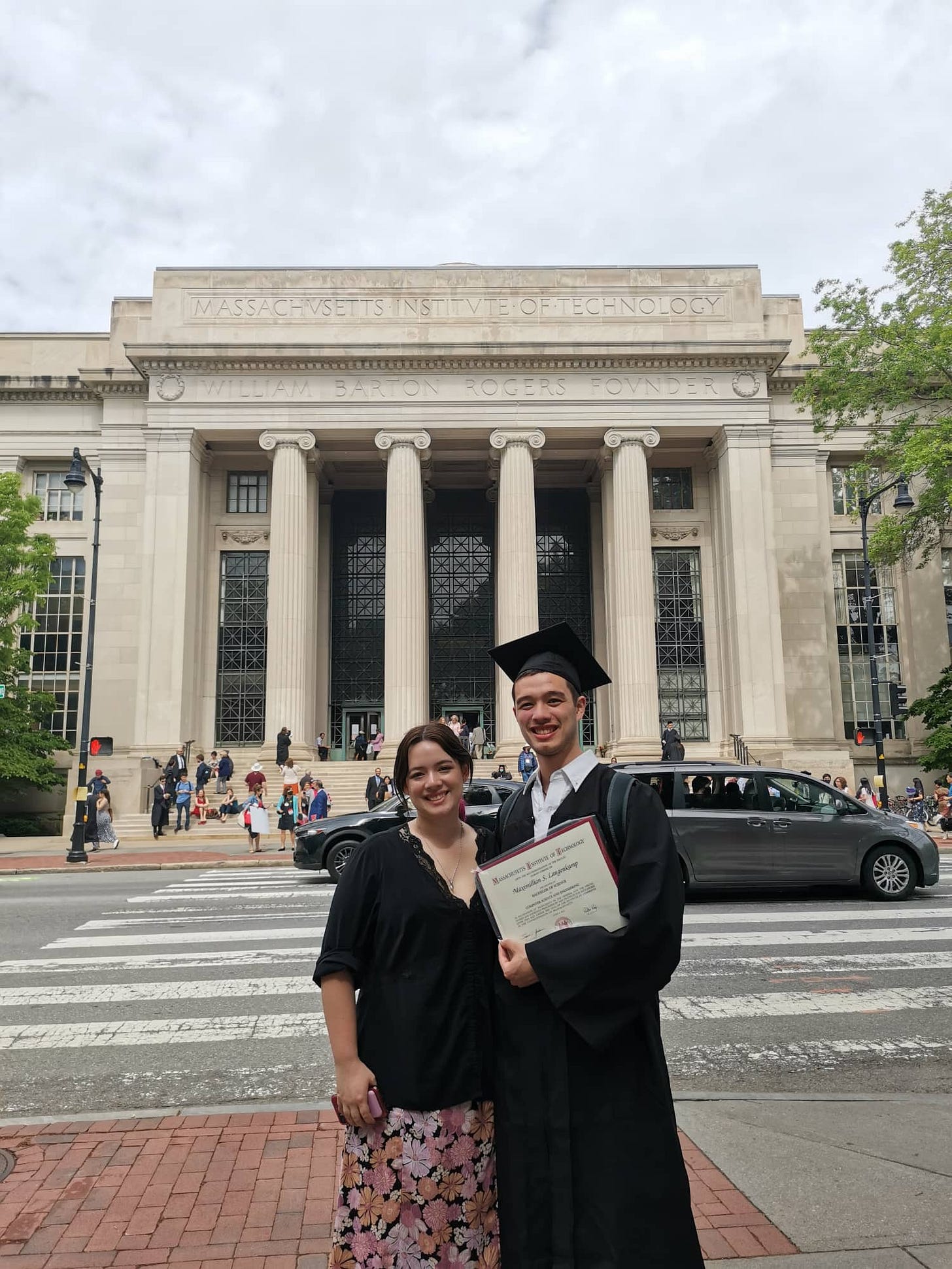9. Finis
In short: I finished my thesis and graduated with my master’s degree! A short version of the thesis is going to be a paper at AIES (Oxford). Follow my next adventures here.
Hello,
This newsletter has become somewhat of a happy failure.
I didn’t end up needing to rely on the newsletter to force me to make progress; the (mostly imagined) pressure from my advisor worked just fine.
Funnily enough, I think the bulk of the project really started to happen once I stopped writing these biweekly updates.
Three key changes:
Finding a collaborator
I met Daniel Yue in an economics of innovation class I took for fun the previous semester. He heard me ask a question in class, found my personal website, and asked to get coffee. It turns out we had overlapping research interests, and our coffee turned into an AI Ethics and Society paper (How Open Source Machine Learning Software Shapes AI).
The funnest and most productive moments during my thesis were standing before a whiteboard with Daniel trying to propose a general theory of how ‘openness’ shapes technology.
I learned how important in-person collaboration was to me.Abandoning the ‘governance’ angle
My initial research question had been “how does open source ML governance shape AI research?” I’d wanted to take an angle inspired by Elinor Ostrom (hence this newsletter’s name and icon), but it took multiple months of talking to various practitioners to realize that this question was not particularly productive — though I still believe that the way these repositories are governed certainly shapes AI research, I wasn’t able to characterize the factors in a helpful way. So I pivoted.Expanding the scope of my thesis
As I found my research question(s), different sub-questions began to appear. “How does open source machine learning software (MLOSS) shape ML?” became “why is MLOSS produced?” and “how will MLOSS shape ML in the future?”.
As the scope expanded, so did the tools I employed. What began with rudimentary economic modeling turned into qualitative social science, business strategy, and some philosophy of technology. Part of me certainly wishes the thesis was more technical because I) it would more directly reflect the skills I’ve spent the last five years acquiring and II) technical work garners more prestige at MIT. Mostly, though, I consider these to be poor reasons.
Because the question I settled on was so broad, I ended up taking a highly interdisciplinary approach (ranging from simple accounting to business strategy to the philosophy of technology) which is honestly where I feel most natural. I’ve never been comfortable thinking wholly within a single discipline
What’s next?
Besides writing some small follow-on explanatory pieces, I’m wide open. I've deliberately stepped away from most commitments for the next few months.
I’ll be traveling around the world, breaking stale thought patterns, constructing and articulating my Tibetan-Buddhist-inflected orientation towards life, and listening to good jazz. I will mostly not be thinking about AI. If you are so disposed, you can follow my thoughts on my new publication, Re-enchanting the Modern World. (If you’re a friend of mine, I’ve probably added you already. You may also want to check your junk folder to make sure my emails are correctly sending)
External Links
[ACX] Book Review: The Anti-Politics Machine. Nominally about tensions in developmental economics, really about technocracy and nebulosity.
In 1975, the World Bank released a report on Lesotho: a tiny, mountainous country surrounded on all sides by the much larger nation of South Africa. This report, written by and for outside “development experts”, set out to identify problems that were holding the country back which could be solved by simple, technical “interventions”…
To the economists writing the report, the fact that cattle were not being sold was a clear sign of a market failure -- surely this meant that either the cattle were too low quality to sell, or the population did not have access to markets. Since this story (1) made sense of a data point that was otherwise confusing, (2) fit with economists’ intuitions for why a person might not sell their “product”, and (3) lent itself to being solved with standard tools (programs to improve cattle quality! programs to connect people with markets!), it seemed like a natural and parsimonious explanation of the facts. So natural and parsimonious, in fact, that the authors don’t seem to have thought to check whether it was actually true…There’s another angle to this: Ferguson’s most incisive insights arise not from studying the people being “served”, but by studying the development practitioners themselves. Other social scientists have continued this trend, from McGovern’s An Anthropologist Among the Mandarins and Robinson’s How Different Social Scientists Think to Marchais, Bazuzi, and Lameke’s The Data is Gold, and We Are The Gold-Diggers and Omar Bah’s webcomic Mzungus in Development and Governments. Each new paper illuminates the research process in new ways, and provides tools both to do better research and to identify potential weaknesses in the pre-existing literature.

